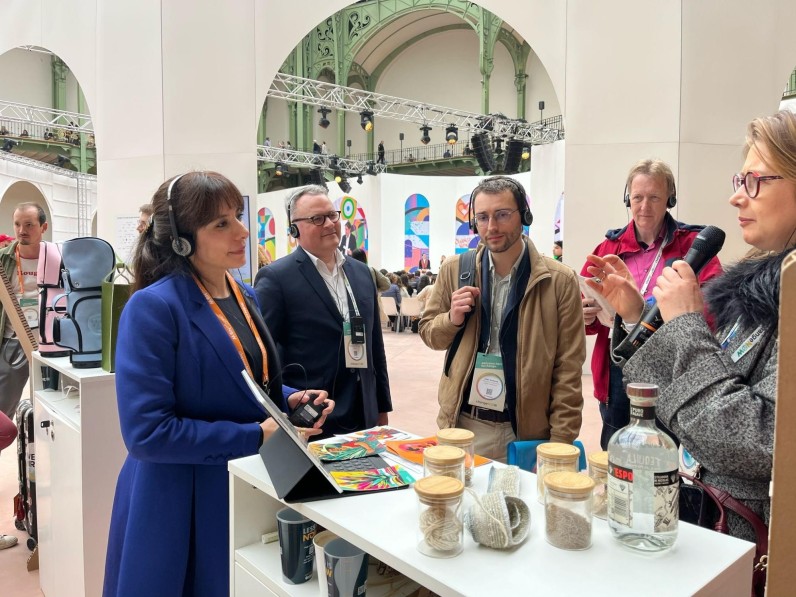
The fashion industry is responsible for up to 8% of global carbon emissions and is the second-largest consumer of water globally, according to UNEP. While sustainability is a growing concern, fewer than 10% of fashion brands have embraced truly sustainable practices. Snova is redefining sustainable innovation by transforming agriculture and agri-industrial waste into next-generation, biodegradable materials. Starting with byproducts from tequila and mezcal production, the company is part of a regenerative revolution, turning environmental challenges into opportunities for lasting impact across textiles, home decor, pet products, and beyond.
Founded by Dora Gutierrez, Snova is advancing a new standard for sustainable textiles through applied bio-innovation. By repurposing agricultural waste into high-performance fibers, the company significantly reduces water usage, minimizes carbon emissions, and contributes to meaningful waste reduction. Even better? Beyond its environmental impact, Snova weaves social responsibility into every stage of production, supporting fair labor practices and fostering economic opportunities that empower and uplift artisan communities in Mexico.
Transforming Fashion with Sustainable Textiles
Each year, the global fashion industry generates 92 million tons of textile waste, ending up in landfills due to resource-intensive production models. Snova tackles these challenges through regenerative fiber technology that minimizes environmental harm while embracing the principles of circularity. By designing materials that give waste a second life and prioritize resource renewal, Snova is reimagining how textiles can flow through the economy, supporting healthier ecosystems and a more sustainable future.
Snova's technology:
• Reduces water consumption by up to 80% compared to traditional textile production.
• Minimizes carbon emissions by transforming agave waste into valuable resources, with a long-term goal of achieving carbon neutrality.
• Enables full supply chain transparency through blockchain-based traceability, ensuring ethical sourcing from origin to final product.
By building circular systems rooted in regenerative principles, Snova creates lasting value for communities, ecosystems, and industries, demonstrating that sustainability can drive long-term positive change.

A Founder Driven by Purpose and Innovation
Dora Gutierrez's journey to founding Snova was shaped by a global career leading business transformation and international expansion at some of the world's largest companies, including Amazon, Walmart, and AB InBev. In roles spanning product development, supply chain innovation, and operational optimization, she learned how to scale ideas that balance growth with efficiency. At Amazon, her leadership helped launch new business verticals, expanding access to categories like pharmacy, groceries, and liquor.
But Gutierrez's vision for impact has always gone beyond corporate success. While advancing global operations, she also founded a nonprofit in Mexico dedicated to empowering low-income children through creativity and education—an early expression of her belief that innovation must be inclusive and community-rooted.
Now, with Snova, Gutierrez joins a new wave of bio-innovators transforming waste into high-performance, biodegradable materials. She's proving that science, creativity, and sustainability can—and should go hand in hand.
Now, with Snova, Gutierrez is pioneering a biotech-driven approach to fashion. As she does, she's proving that inventiveness and sustainability can go hand in hand.
"We're not just creating sustainable textiles—we're redefining how industries view and utilize waste. Regenerative innovation allows us to turn environmental challenges into opportunities for lasting impact," says Gutierrez.
Scaling Innovation for a Regenerative Economy
While Snova's first fibers are born from tequila industry waste, the company's vision extends much further. Its bio-innovation processes are designed to adapt to a range of agricultural byproducts, such as corn and banana waste, opening new pathways for sustainable material production. By building a flexible, waste-to-value model, Snova aims to reduce industry reliance on virgin resources while unlocking new economic opportunities rooted in regeneration.
Driving Social Impact Through Ethical Production
At Snova, sustainability extends beyond creating eco-friendly materials; it also focuses on supporting the people involved in the process. The company aims to integrate social responsibility across its supply chain, ensuring fair wages and creating economic opportunities for local communities.
In Oaxaca, Mexico, Snova works with indigenous artisans to incorporate sustainable fibers into traditional textiles, helping preserve cultural practices while providing artisans with better compensation. Additionally, Snova partners with initiatives that offer incarcerated women opportunities for skill development and employment through textile craftsmanship. These efforts reflect the company's belief that innovation should be inclusive, offering a broader benefit to communities in need.
By focusing on ethical labor practices and fair wages, Snova highlights how sustainability can address both environmental and social challenges, creating a more holistic approach to production.
The Future of Snova: Expanding Global Impact
Though Snova initially focused on the tequila industry waste, its approach to bio-innovation is evolving to include a variety of agricultural byproducts, such as corn. This adaptability allows the company to explore new ways of producing sustainable materials while working to reduce reliance on virgin resources and contribute to a circular economy.
Snova's collaborations with bio-fabrication experts and its involvement in global sustainability discussions position it as part of the broader movement toward more sustainable material production. The company's focus on regenerative processes could contribute to long-term industry shifts, where sustainable materials become more widely adopted and accessible.
The future for Snova is not just about transforming waste—it's about exploring new possibilities for sustainable production that are rooted in regenerating local economies and broader environmental goals.







Join the Conversation